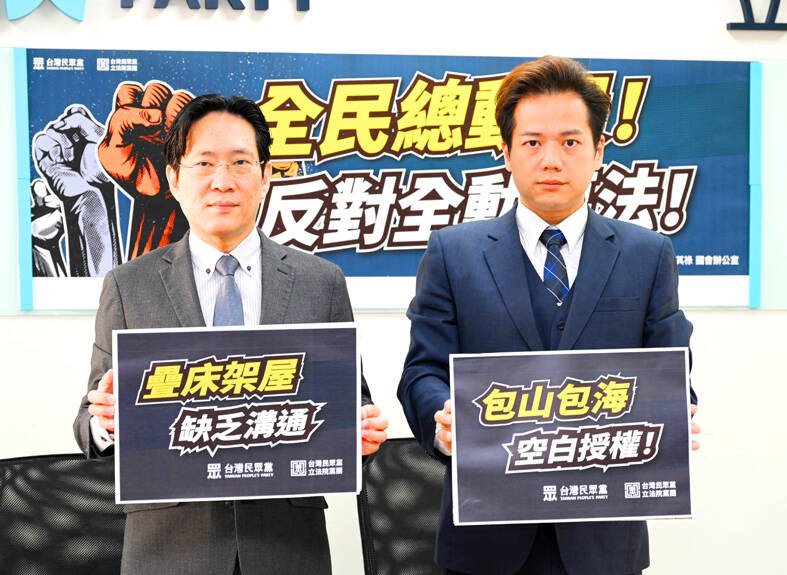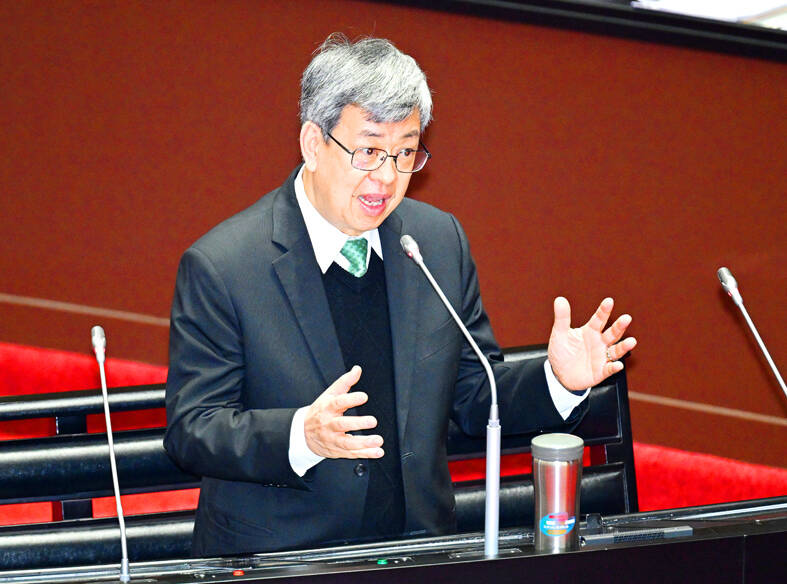The Ministry of National Defense is to take down draft amendments to the General Mobilization Act (全民防衛動員準備法) from its Web site and revise them after considering input from all sides, Premier Chen Chien-jen (陳建仁) said yesterday.
Chen made the remarks in response to independent Legislator Huang Kuo-shu (黃國書) at a question-and-answer session at the Legislative Yuan in Taipei.
The ministry posted the draft on its Web site on Feb. 21. After a mandatory 14-day notice period, it was planning to send it to the Executive Yuan for approval and thereafter to the legislature.

Photo: Tian Yu-hua, Taipei Times
However, Chen said there have been concerns about the draft, adding that the ministry would revise it.
The draft amendments define two phases of mobilization per presidential order — peacetime “mobilization preparation” and emergency or wartime “mobilization implementation.”
Critics took issue with the proposed provision that when the act is activated, local governments and the news media would have to cooperate with the central government, which would be allowed to enforce controls on all information networks, including online media, publishers and TV channels.

Photo: Liao Chen-huei, Taipei Times
As the draft does not clearly define “mobilization preparation,” critics said that the provision could be used by the government to limit press freedom.
Chen said a revision to the act “is what the nation urgently needs, but there was apparent miscommunication about certain aspects of the draft amendments, such as youngsters going to the battlefield or manufacturing arms and restricting the media.”
The ministry should maintain communication with other government departments and communicate with the public on the planned changes, he said.
Separately yesterday, the Taiwan People’s Party (TPP) caucus urged the government to gather more input from all sides before amending the act.
TPP caucus convener Chiu Chen-yuan (邱臣遠) accused the Executive Yuan of only speaking with Democratic Progressive Party (DPP) lawmakers about the issue, calling it “an act indicating that the Executive Yuan is not maintaining administrative neutrality under a DPP-led government.”
Many provisions in the draft overlap with the Civil Defense Act (民防法) and the Disaster Prevention and Protection Act (災害防救法), Chiu said, adding that the draft would give the Executive Yuan “a blank check to do as it pleases.”
TPP Legislator Jang Chyi-lu (張其祿) said modern warfare is conducted in a manner vastly different from World War II, but the amendments show that the government’s mindset is stuck in the past.
The government must abandon the “authoritarian” mindset of “concentrating power to resolve issues of great importance,” Jang said.
Instead it should utilize the strengths of the public to adapt to threats posed by modern warfare, he added.
Additional reporting by CNA

Taiwan has received more than US$70 million in royalties as of the end of last year from developing the F-16V jet as countries worldwide purchase or upgrade to this popular model, government and military officials said on Saturday. Taiwan funded the development of the F-16V jet and ended up the sole investor as other countries withdrew from the program. Now the F-16V is increasingly popular and countries must pay Taiwan a percentage in royalties when they purchase new F-16V aircraft or upgrade older F-16 models. The next five years are expected to be the peak for these royalties, with Taiwan potentially earning

STAY IN YOUR LANE: As the US and Israel attack Iran, the ministry has warned China not to overstep by including Taiwanese citizens in its evacuation orders The Ministry of Foreign Affairs (MOFA) yesterday rebuked a statement by China’s embassy in Israel that it would evacuate Taiwanese holders of Chinese travel documents from Israel amid the latter’s escalating conflict with Iran. Tensions have risen across the Middle East in the wake of US and Israeli airstrikes on Iran beginning Saturday. China subsequently issued an evacuation notice for its citizens. In a news release, the Chinese embassy in Israel said holders of “Taiwan compatriot permits (台胞證)” issued to Taiwanese nationals by Chinese authorities for travel to China — could register for evacuation to Egypt. In Taipei, the ministry yesterday said Taiwan

Taiwan is awaiting official notification from the US regarding the status of the Agreement on Reciprocal Trade (ART) after the US Supreme Court ruled US President Donald Trump's global tariffs unconstitutional. Speaking to reporters before a legislative hearing today, Premier Cho Jung-tai (卓榮泰) said that Taiwan's negotiation team remains focused on ensuring that the bilateral trade deal remains intact despite the legal challenge to Trump's tariff policy. "The US has pledged to notify its trade partners once the subsequent administrative and legal processes are finalized, and that certainly includes Taiwan," Cho said when asked about opposition parties’ doubts that the ART was

If China chose to invade Taiwan tomorrow, it would only have to sever three undersea fiber-optic cable clusters to cause a data blackout, Jason Hsu (許毓仁), a senior fellow at the Hudson Institute and former Chinese Nationalist Party (KMT) legislator, told a US security panel yesterday. In a Taiwan contingency, cable disruption would be one of the earliest preinvasion actions and the signal that escalation had begun, he said, adding that Taiwan’s current cable repair capabilities are insufficient. The US-China Economic and Security Review Commission (USCC) yesterday held a hearing on US-China Competition Under the Sea, with Hsu speaking on